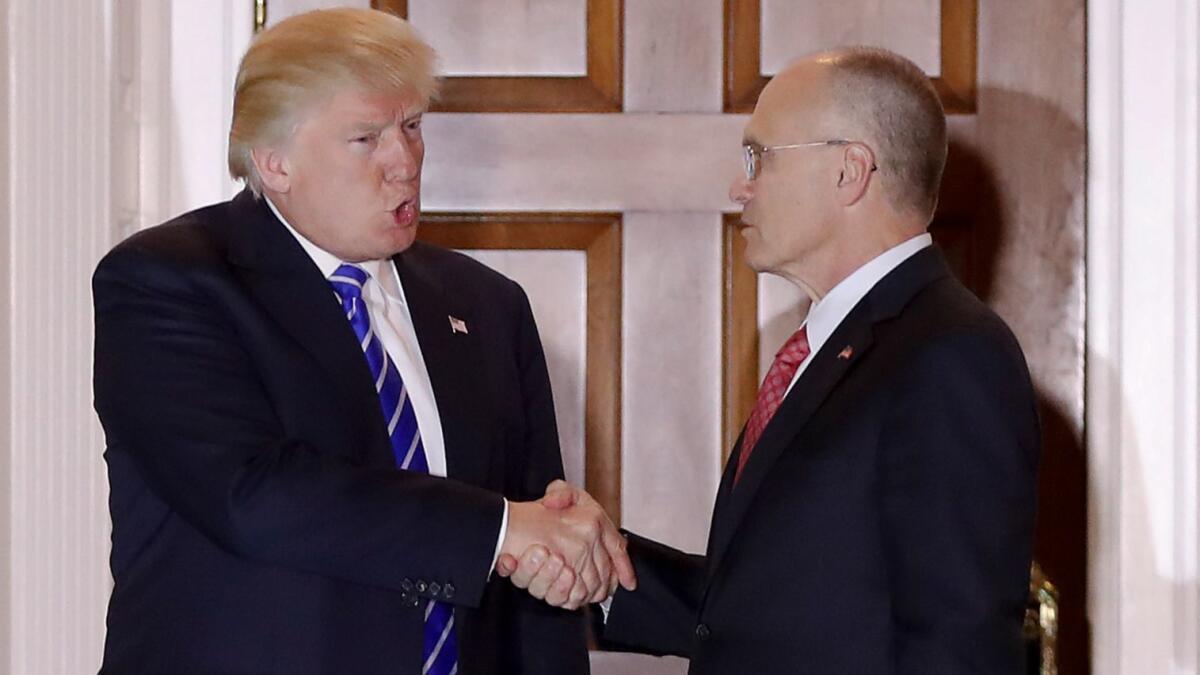How will the workplace change under Trump? Here are some clues

- Share via
The Trump administration could make numerous changes that affect the workplace, and although it’s anyone’s guess what shape those changes will take, the new president’s Cabinet picks and campaign rhetoric offer some clues.
Here are six workplace issues to watch.
E-Verify
A chief rallying cry of President Trump’s campaign involved limiting immigration to boost employment among native-born Americans, and a position paper outlining how he would do that includes mandating E-Verify nationwide to keep employers from hiring people who are in the country illegally.
E-Verify, a system for employers to electronically check new hires’ identity information against government databases before permitting them to work, has been required of federal contractors and vendors since 2007. Some states require public or private employers to use the system; California does not. Critics of E-Verify raise concerns about privacy, implementation burdens and inaccuracies that keep legal immigrants from working.
Quickie union election rule
In 2014, the National Labor Relations Board issued a rule that, among other things, shortened the time period between when a union files for an election and the election itself. Critics say that makes it easier for unions to organize workers because employers have less time to present their arguments against union representation.
That rule is among several policies adopted by the NLRB’s Democratic majority that could be walked back if Trump appoints more conservative members to the board. He could also restrict the board’s funding to limit enforcement. The five-member panel currently has two vacancies, and the general counsel who decides which cases are heard by the board will see his term expire this year.
Joint employer standard
One of the NLRB’s most controversial moves under the Obama administration was to broaden the definition of “joint employer” such that more companies could be held liable for labor law violations by their subcontractors or franchisees, and be brought to the bargaining table should workers employed by subcontractors unionize.
The agency’s closely watched Browning-Ferris decision in 2015 said a company can be a joint employer if it exerts “indirect control” over workers, or if it “reserves” control even if it does not exercise it. The decision has been appealed to the U.S. Court of Appeals for the District of Columbia Circuit. But the new joint employer standard, opposed by congressional Republicans, might not last under Trump. The president “would presumably sign into law any congressional effort to legislate the reversal of a controversial [NLRB] decision — such as the Browning-Ferris joint employer case — that does not align with his policies,” according to an analysis by the law firm Littler Mendelson, which represents management in employment cases.
Trump’s pick for Labor secretary, fast-food executive Andrew Puzder, has denounced the broadening of the joint employer definition. “I would be close to shocked if the joint employer guidance and the emphasis on joint employers from the administrative standpoint isn’t completely walked backwards,” said Jeff Risch, chair of the labor and employment practice at the law firm SmithAmundsen. Still, he said, the Obama administration has shined a spotlight on the issue and spurred lawsuits that are being evaluated by the courts, so the floodgates already may be opened.
Mandatory arbitration agreements
A hotly debated topic in labor law is whether it’s legal for employers to require workers to resolve disputes through arbitration rather than class-action lawsuits — a big money- and headache-saver for employers.
Although the NLRB has argued that such requirements violate workers’ right to concerted activities under the National Labor Relations Act, circuit courts have been split on the issue, and the Supreme Court previously has held that such requirements are enforceable under the Federal Arbitration Act. The lower-court split sets the stage for potential review by the Supreme Court.
EEOC pay reporting rule
Amid a national conversation about a persistent wage gap between men and women, the Equal Employment Opportunity Commission announced that employers will have to start providing data on employee pay and hours by sex, race and ethnicity in order to help the agency investigate pay discrimination. The first reports are due in March 2018.
Many employers, who already report how many people they employ by race and gender, have complained it’s a major paperwork headache. Trump didn’t mention the EEOC guidelines on the campaign trail, but some observers say a more conservative EEOC under his administration could revise or rescind the regulations before they take effect.
Overtime rule
A last-minute injunction against a new Labor Department rule that would double — to nearly $48,000 — the minimum salary someone must make before they can be exempt from overtime pay has left the rule’s fate in question.
A Texas federal judge blocked the planned Dec. 1 implementation of the rule, a signature Obama administration initiative meant to boost middle-class incomes, until he decides whether it’s lawful. There’s no timeline on when that decision might come. Labor nominee Puzder, who has criticized the overtime rule, could modify or roll it back.
But California has its own requirement that overtime be paid to salaried workers who earn less than $41,600 a year and allows them to claim overtime after working more than eight hours in a day.
aelejalderuiz@chicagotribune.com
Elejalde-Ruiz writes for the Chicago Tribune. Times staff writer Melissa Etehad contributed to this report.
ALSO
New FCC chairman Ajit Pai wants to take a ‘weed whacker’ to net neutrality
Consumer Financial Protection Bureau chief says Trump won’t tone down his agency
As Trump pushes for U.S. manufacturing, ‘Made in America’ is losing its luster in the fashion world
More to Read
Inside the business of entertainment
The Wide Shot brings you news, analysis and insights on everything from streaming wars to production — and what it all means for the future.
You may occasionally receive promotional content from the Los Angeles Times.










